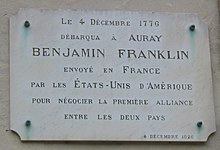

Benjamin Franklin was responsible for writing satirical comedies. His most notable humorous work is the collection called The Bagatelles.


Benjamin Franklin was responsible for writing satirical comedies. His most notable humorous work is the collection called The Bagatelles.
The Bagatelles, or jeux d'espirit in French, are a collection of comics produced in Franklin's Passy Press in France. [1] [2]
Rules by Which a Great Empire May Be Reduced to a Small One is a comedic work that Benjamin Franklin wrote in 1773. Franklin wrote it to insult the colonies' secretary of state, but wrote as if giving Machiavellian advice on how to lose an empire. Franklin pretended to advocate the tyranny that many over-imposed rulers desire as necessary to lose support of the people. For instance: to keep colonies under control, "...quarter troops among them, who by their insolence may provoke rising of mobs." (Franklin, 1773) This work also advocated poor representation of the ruler. [3]
Remarks Concerning the Savages of North America was prose, published 1784, which highlighted that just because a culture is different from your own, it shouldn't be considered as something "savage". [4]

Benjamin Franklin was an American polymath who was active as a writer, scientist, inventor, statesman, diplomat, printer, publisher, and political philosopher. Among the leading intellectuals of his time, Franklin was one of the Founding Fathers of the United States, a drafter and signer of the Declaration of Independence, and the first Postmaster General.
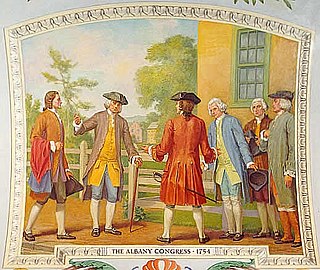
The Albany Congress, also known as the Albany Convention of 1754, was a meeting of representatives sent by the legislatures of seven of the British colonies in British America: Connecticut, Maryland, Massachusetts, New Hampshire, New York, Pennsylvania, and Rhode Island. Those not in attendance included Newfoundland, Nova Scotia, New Jersey, Virginia, Georgia, North Carolina, and South Carolina. Representatives met daily at the City Hall in Albany, New York, from June 19 to July 11, 1754, to discuss better relations with the Native American tribes and common defensive measures against the French threat from Canada in the opening stage of the French and Indian War, the North American front of the Seven Years' War between Great Britain and France.
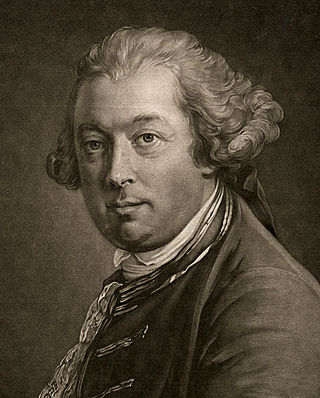
Thomas Pownall was a British colonial official and politician. He was governor of the Province of Massachusetts Bay from 1757 to 1760, and afterwards sat in the House of Commons from 1767 to 1780. He travelled widely in the North American colonies prior to the American Revolutionary War, opposed Parliamentary attempts to tax the colonies, and was a minority advocate of colonial positions until the Revolution.

Passy is an area of Paris, France, located in the 16th arrondissement, on the Right Bank. It is adjacent to Auteuil to the southwest, and Chaillot to the northeast.

The Townshend Acts or Townshend Duties, were a series of British acts of Parliament passed during 1767 and 1768 introducing a series of taxes and regulations to fund administration of the British colonies in America. They are named after the Chancellor of the Exchequer who proposed the program. Historians vary slightly as to which acts they include under the heading "Townshend Acts", but five are often listed:

Anthony Benezet was a French-born American abolitionist and teacher who was active in Philadelphia, Pennsylvania. A prominent member of the abolitionist movement in North America, Benezet founded one of the world's first anti-slavery societies, the Society for the Relief of Free Negroes Unlawfully Held in Bondage. He also founded the first public school for girls in North America and the Negro School at Philadelphia, which operated into the nineteenth century. Benezet was a vegetarian and advocated for the kind treatment of animals, integrating these views into his teachings.

The American Enlightenment was a period of intellectual and philosophical fervor in the thirteen American colonies in the 18th to 19th century, which led to the American Revolution and the creation of the United States of America. The American Enlightenment was influenced by the 17th- and 18th-century Age of Enlightenment in Europe and native American philosophy. According to James MacGregor Burns, the spirit of the American Enlightenment was to give Enlightenment ideals a practical, useful form in the life of the nation and its people.
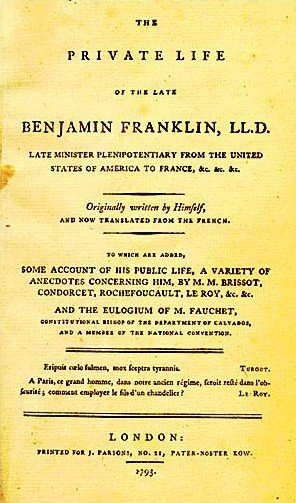
The Autobiography of Benjamin Franklin is the traditional name for the unfinished record of his own life written by Benjamin Franklin from 1771 to 1790; however, Franklin appears to have called the work his Memoirs. Although it had a tortuous publication history after Franklin's death, this work has become one of the most famous and influential examples of an autobiography ever written.

Édouard René Lefèbvre de Laboulaye was a French jurist, poet, author and anti-slavery activist. In 1865, he originated the idea of a monument presented by the French people to the United States that resulted in the Statue of Liberty in New York Harbor. He got the idea thinking that this would help strengthen their relationship with the United States.

Juan Victor Séjour Marcou et Ferrand was an American Creole of color and expatriate writer. Born in New Orleans, he spent most of his career in Paris. His fiction and plays were written and published in French. Although mostly unknown to later American writers of the nineteenth century, his short story "Le Mulâtre" is the earliest known work of fiction by an African American author. In France, however, he was known chiefly for his plays.


Join, or Die. is a political cartoon showing the disunity in the American colonies. Attributed to Benjamin Franklin, the original publication by The Pennsylvania Gazette on May 9, 1754, is the earliest known pictorial representation of colonial union produced by an American colonist in Colonial America.

Letters from a Farmer in Pennsylvania is a series of essays written by the Pennsylvania lawyer and legislator John Dickinson (1732–1808) and published under the pseudonym "A Farmer" from 1767 to 1768. The twelve letters were widely read and reprinted throughout the Thirteen Colonies, and were important in uniting the colonists against the Townshend Acts in the run-up to the American Revolution. According to many historians, the impact of the Letters on the colonies was unmatched until the publication of Thomas Paine's Common Sense in 1776. The success of the letters earned Dickinson considerable fame.
Nationality words link to articles with information on the nation's poetry or literature.

The Hutchinson Letters affair was an incident that increased tensions between the colonists of the Province of Massachusetts Bay and the British government prior to the American Revolution.
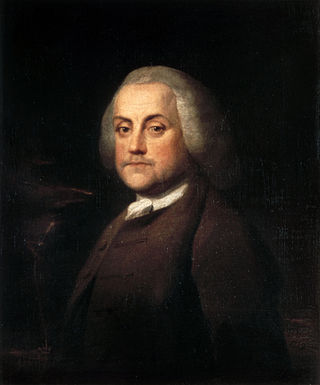
The Albany Plan of Union was a rejected plan to create a unified government for the Thirteen Colonies at the Albany Congress on July 10, 1754 in Albany, New York. The plan was suggested by Benjamin Franklin, then a senior leader and a delegate from Pennsylvania. Franklin spent much time among the Iroquois observing their deliberations and pleaded with the colonial leaders to consider the plan. More than twenty representatives of several Northern Atlantic colonies had gathered to plan their defense related to the French and Indian War (1754–1763), the front in North America of the Seven Years' War between Great Britain and France, spurred on by George Washington's recent defeat in the Ohio valley. The Plan represented one of multiple early attempts to form a union of the colonies "under one government as far as might be necessary for defense and other general important purposes." The plan was rejected but it was a forerunner for the Articles of Confederation and the United States Constitution.
Observations Concerning the Increase of Mankind, Peopling of Countries, etc. is a short essay written in 1751 by American polymath Benjamin Franklin. It was circulated by Franklin in manuscript to his circle of friends, but in 1755 it was published as an addendum in a Boston pamphlet on another subject. It was reissued ten times during the next 15 years.
James Tobin (1736/7–1817) was a prominent merchant and planter based in Nevis. During his life, he became one of the most prominent proslavery activists from the West Indies.

The Papers of Benjamin Franklin is a collaborative effort by a team of scholars at Yale University, American Philosophical Society and others who have searched, collected, edited, and published the numerous letters from and to Benjamin Franklin, and other works, especially those involved with the American Revolutionary period and thereafter. The publication of Franklin's papers has been an ongoing production since its first issue in 1959, and is expected to reach nearly fifty volumes, with more than forty volumes completed as of 2022. The costly project was made possible from donations by the American Philosophical Association and Life magazine.